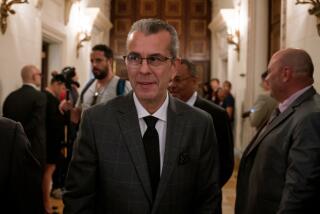Zia Victory Seen in Pakistan Despite 5 Ministers’ Defeat
ISLAMABAD, Pakistan — Five Cabinet ministers in President Zia ul-Haq’s military government were defeated in Monday’s National Assembly election, returns showed Tuesday. The U.S. ambassador to Pakistan hailed the election as a breakthrough toward the restoration of democracy.
Despite the defeat of the five ministers and a prominent opposition leader’s claim that the election resulted in an “effective no-confidence” vote in Zia’s regime, the overall results were widely interpreted as a victory for Zia because of the size of the turnout. Opposition leaders had called for a boycott of the voting, but government election officials said 52% of the country’s voters had participated.
Zia, Pakistan’s leader since he seized power in 1977, is assured of five more years as president as the result of a controversial referendum he held in December asking voters to keep him in office.
The American envoy, Deane R. Hinton, predicted in an interview Tuesday that the elections, the first in almost eight years, will lead to the lifting of martial law. However, he said he expects that Zia will do it “in phases.”
“I think he is going to wait to watch this new animal (National Assembly) and see how it functions first,” the envoy said.
Six of Zia’s Cabinet ministers--two of whom ran unopposed--won election to the National Assembly.
The five defeated ministers are Raja Zafarul Haq, minister of information and acting minister for religious affairs; Ali Ahmad Talpur, defense; Arbab Niaz Mohammed, culture; Ghulam Dastigir Khan, labor, and Raja Sikandar Zaman, water and power. Zafarul Haq had been instrumental in Zia’s campaign to enforce Islamic law.
Turnout Figure Challenged
Asghar Khan, the only leading opposition politician still free, challenged official announcements of the voter turnout, saying that it was only 5% to 15% in the cities and 15% to 25% in rural areas.
The head of the Tehrik-i-Istiqlal party, Asghar Khan noted Zia’s banning of political parties in the campaign and said the defeat of Cabinet ministers, even though the people had no opposition groups to rally around, indicated an “effective no-confidence” vote in Zia’s policies. Zia foes could run for office but not under a party banner.
However, Hinton said in his interview that the losses by the five Cabinet ministers is “proof (the elections) were honest and fair. It is also proof of some dissatisfaction in the country.”
He added that the defeat of the Zia aides will have little effect on the government. “I think the inner team is intact,” he said. “I think the guys he really relies on to run this country didn’t run. . . .”
After the boycott was called by opposition leaders, Zia also ordered the arrest of more than 800 prominent politicians. And he permitted no political rallies or parades.
Hinton, despite his optimism about the election results, acknowledged that there will be risks when the elected national and state assemblies argue sensitive issues involving the economy and Pakistan’s continued acceptance of 3 million refugees from Afghanistan.
“The assemblies are going to debate . . .,” the ambassador said. “The American political doctrine is that this is good--good to talk and get the issues out. But it might also work the other way.
“Pakistan is a country with little political experience and with a reputation for volatility and taking to the streets in violence,” said Hinton, who previously served as American ambassador to El Salvador. “With a population overwhelmingly illiterate, will democracy work under such circumstances? We think it can but we are aware of the risks. Nobody can predict.”
Hinton said Zia had not called Monday’s assembly election as a result of pressure from the United States, which has a five-year $3.2 billion military and economic aid agreement with Pakistan.
“I think Zia came to the conclusion all by himself,” he said. “I think he understands pretty well you need a broader base--what they call an Islamic consensus--than just the military and the bureaucracy.”
Monday’s elections constituted the first half of a two-part balloting process this week. On Thursday, voters in the provinces will go to the polls to select provincial assemblies. Visits to the Pakistani countryside Tuesday suggested that there is likely to be even greater participation in those votes than in the national elections.
More to Read
Sign up for Essential California
The most important California stories and recommendations in your inbox every morning.
You may occasionally receive promotional content from the Los Angeles Times.










